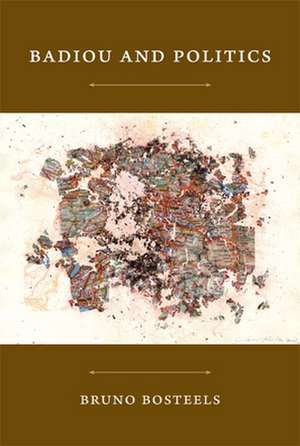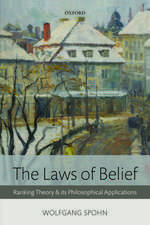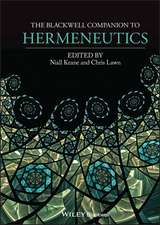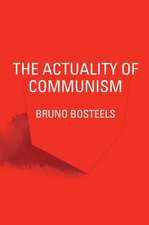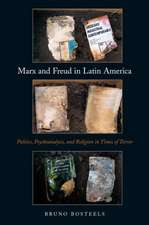Badiou and Politics: Post-Contemporary Interventions
Autor Bruno Bosteelsen Limba Engleză Paperback – 9 aug 2011
Din seria Post-Contemporary Interventions
-
 Preț: 194.51 lei
Preț: 194.51 lei -
 Preț: 159.67 lei
Preț: 159.67 lei -
 Preț: 203.53 lei
Preț: 203.53 lei -
 Preț: 239.81 lei
Preț: 239.81 lei -
 Preț: 310.83 lei
Preț: 310.83 lei -
 Preț: 210.08 lei
Preț: 210.08 lei -
 Preț: 264.26 lei
Preț: 264.26 lei -
 Preț: 239.54 lei
Preț: 239.54 lei -
 Preț: 241.11 lei
Preț: 241.11 lei -
 Preț: 312.96 lei
Preț: 312.96 lei -
 Preț: 335.51 lei
Preț: 335.51 lei -
 Preț: 307.74 lei
Preț: 307.74 lei -
 Preț: 231.22 lei
Preț: 231.22 lei -
 Preț: 239.54 lei
Preț: 239.54 lei -
 Preț: 266.77 lei
Preț: 266.77 lei -
 Preț: 265.20 lei
Preț: 265.20 lei -
 Preț: 309.49 lei
Preț: 309.49 lei -
 Preț: 229.09 lei
Preț: 229.09 lei -
 Preț: 300.06 lei
Preț: 300.06 lei -
 Preț: 266.55 lei
Preț: 266.55 lei -
 Preț: 299.29 lei
Preț: 299.29 lei -
 Preț: 305.61 lei
Preț: 305.61 lei -
 Preț: 308.72 lei
Preț: 308.72 lei -
 Preț: 266.77 lei
Preț: 266.77 lei -
 Preț: 238.99 lei
Preț: 238.99 lei -
 Preț: 262.32 lei
Preț: 262.32 lei -
 Preț: 203.18 lei
Preț: 203.18 lei -
 Preț: 262.91 lei
Preț: 262.91 lei -
 Preț: 240.35 lei
Preț: 240.35 lei -
 Preț: 203.56 lei
Preț: 203.56 lei -
 Preț: 264.82 lei
Preț: 264.82 lei -
 Preț: 210.08 lei
Preț: 210.08 lei -
 Preț: 300.06 lei
Preț: 300.06 lei -
 Preț: 306.99 lei
Preț: 306.99 lei -
 Preț: 265.97 lei
Preț: 265.97 lei -
 Preț: 195.41 lei
Preț: 195.41 lei -
 Preț: 211.04 lei
Preț: 211.04 lei -
 Preț: 221.33 lei
Preț: 221.33 lei -
 Preț: 266.47 lei
Preț: 266.47 lei -
 Preț: 209.85 lei
Preț: 209.85 lei -
 Preț: 232.87 lei
Preț: 232.87 lei -
 Preț: 268.46 lei
Preț: 268.46 lei -
 Preț: 310.08 lei
Preț: 310.08 lei -
 Preț: 303.11 lei
Preț: 303.11 lei -
 Preț: 301.97 lei
Preț: 301.97 lei -
 Preț: 267.70 lei
Preț: 267.70 lei -
 Preț: 267.15 lei
Preț: 267.15 lei -
 Preț: 203.34 lei
Preț: 203.34 lei -
 Preț: 311.22 lei
Preț: 311.22 lei
Preț: 258.90 lei
Nou
Puncte Express: 388
Preț estimativ în valută:
49.54€ • 51.19$ • 41.21£
49.54€ • 51.19$ • 41.21£
Carte tipărită la comandă
Livrare economică 19 martie-02 aprilie
Preluare comenzi: 021 569.72.76
Specificații
ISBN-13: 9780822350767
ISBN-10: 0822350769
Pagini: 464
Dimensiuni: 155 x 233 x 30 mm
Greutate: 0.66 kg
Editura: Wiley
Seria Post-Contemporary Interventions
ISBN-10: 0822350769
Pagini: 464
Dimensiuni: 155 x 233 x 30 mm
Greutate: 0.66 kg
Editura: Wiley
Seria Post-Contemporary Interventions
Cuprins
Preface ix
Acknowledgments xxi
Introduction. Elements of Dialectical Materialism 1
1. The Absent Cause 45
2. Lack and Destruction 77
3. One Divides into Two 110
4. The Ontological Impasse 157
5. Forcing the Truth 174
6. Logics of Change 197
7. From Potentiality to Inexistence 226
8. For Lack of Politics 250
Conclusion. The Speculative Left 273
In Dialogue with Alain Badiou
Appendix 1. Can Change Be Thought? 289
Appendix 2. Beyond Formalism 318
Notes 351
Selected Bibliography 407
Index 423
Acknowledgments xxi
Introduction. Elements of Dialectical Materialism 1
1. The Absent Cause 45
2. Lack and Destruction 77
3. One Divides into Two 110
4. The Ontological Impasse 157
5. Forcing the Truth 174
6. Logics of Change 197
7. From Potentiality to Inexistence 226
8. For Lack of Politics 250
Conclusion. The Speculative Left 273
In Dialogue with Alain Badiou
Appendix 1. Can Change Be Thought? 289
Appendix 2. Beyond Formalism 318
Notes 351
Selected Bibliography 407
Index 423
Recenzii
Bosteels, of course, has set himself the task of writing explicitly on Badious relation to politics... Bosteels convincingly demonstrates the dialectical richness of Badious relation of politics to theory.Particularly strong, for example, is Bosteels account of the ways in which Badiou has taken on and advanced Althusser and Lacans rethinking of causality, among other concerns at the intersection of politics, epistemology and ontology. - Tom Eyers, Marx & Philosophy Review of Books, March 2012
Bruno Bosteels fine book restores the political and philosophical context of Alain Badious life work, and shows in particular how he has aimed at completing all the great unfinished problems of contemporary theory, particularly those of Althusser and Lacan. Not only does it serve as a useful introduction to a complex and many-faceted thinker, it also makes it possible for us to grasp some of the debates of the 1960s in a far more comprehensive way than before. Fredric R. Jameson, Duke University
The most eagerly awaited book on Badious political thought yet written, Bruno Bosteels study is in a class of its own in every respect, remarkable as much for its enthusiasm and commitment as for its insight and precision, its depth of analysis and extraordinary breadth of reference. Badiou and Politics not only tracks the full course of Badious own distinctive post-Maoist trajectory in meticulous detail, it also provides an incisive and illuminating discussion of virtually the whole field of emancipatory theoretical engagement after Sartre. Peter Hallward, author of Badiou: A Subject to Truth
The ambitious challenge taken on and met by Badiou and Politics is to add to one of a handful of meta-tropes defining our current era and to add to an already sizable literature base surrounding one of the worlds most significant continental philosophers and living theorists. Bruno Bosteels meets this challenge head on by dividing the major uptake on Badious work into two primary trajectories: the being camp that stresses the logical ontology of oneness as pure multiplicity, and the event camp that traces the ways a subject assumes certain truths as situations prompt particular procedures. Once Bosteels has set up these two approaches, he proposes a third way to encounter Badiou. Bosteels corrective borrows from both approaches, settling on an affirmation of the politics of a dialectical materialism that would deploy both being and event strategies in a substantial reanimation of Badious place on, and contribution to, the philosophical map. - Kevin D. Kuswa, Culture Machine, July 2012
"Bosteels, of course, has set himself the task of writing explicitly on Badiou's relation to politics... Bosteels convincingly demonstrates the dialectical richness of Badiou's relation of politics to theory.Particularly strong, for example, is Bosteels' account of the ways in which Badiou has taken on and advanced Althusser and Lacan's rethinking of causality, among other concerns at the intersection of politics, epistemology and ontology." - Tom Eyers, Marx & Philosophy Review of Books, March 2012 "Bruno Bosteels' fine book restores the political and philosophical context of Alain Badiou's life work, and shows in particular how he has aimed at completing all the great unfinished problems of contemporary theory, particularly those of Althusser and Lacan. Not only does it serve as a useful introduction to a complex and many-faceted thinker, it also makes it possible for us to grasp some of the debates of the 1960s in a far more comprehensive way than before." Fredric R. Jameson, Duke University "The most eagerly awaited book on Badiou's political thought yet written, Bruno Bosteels' study is in a class of its own in every respect, remarkable as much for its enthusiasm and commitment as for its insight and precision, its depth of analysis and extraordinary breadth of reference. Badiou and Politics not only tracks the full course of Badiou's own distinctive post-Maoist trajectory in meticulous detail, it also provides an incisive and illuminating discussion of virtually the whole field of emancipatory theoretical engagement after Sartre." Peter Hallward, author of Badiou: A Subject to Truth "The ambitious challenge taken on and met by Badiou and Politics is to add to one of a handful of meta-tropes defining our current era and to add to an already sizable literature base surrounding one of the world's most significant continental philosophers and living theorists. Bruno Bosteels meets this challenge head on by dividing the major uptake on Badiou's work into two primary trajectories: the 'being' camp that stresses the logical ontology of oneness as pure multiplicity, and the 'event' camp that traces the ways a subject assumes certain truths as situations prompt particular procedures. Once Bosteels has set up these two approaches, he proposes a third way to encounter Badiou. Bosteel's corrective borrows from both approaches, settling on an affirmation of the politics of a dialectical materialism that would deploy both 'being' and 'event' strategies in a substantial reanimation of Badiou's place on, and contribution to, the philosophical map." - Kevin D. Kuswa, Culture Machine, July 2012
Bruno Bosteels fine book restores the political and philosophical context of Alain Badious life work, and shows in particular how he has aimed at completing all the great unfinished problems of contemporary theory, particularly those of Althusser and Lacan. Not only does it serve as a useful introduction to a complex and many-faceted thinker, it also makes it possible for us to grasp some of the debates of the 1960s in a far more comprehensive way than before. Fredric R. Jameson, Duke University
The most eagerly awaited book on Badious political thought yet written, Bruno Bosteels study is in a class of its own in every respect, remarkable as much for its enthusiasm and commitment as for its insight and precision, its depth of analysis and extraordinary breadth of reference. Badiou and Politics not only tracks the full course of Badious own distinctive post-Maoist trajectory in meticulous detail, it also provides an incisive and illuminating discussion of virtually the whole field of emancipatory theoretical engagement after Sartre. Peter Hallward, author of Badiou: A Subject to Truth
The ambitious challenge taken on and met by Badiou and Politics is to add to one of a handful of meta-tropes defining our current era and to add to an already sizable literature base surrounding one of the worlds most significant continental philosophers and living theorists. Bruno Bosteels meets this challenge head on by dividing the major uptake on Badious work into two primary trajectories: the being camp that stresses the logical ontology of oneness as pure multiplicity, and the event camp that traces the ways a subject assumes certain truths as situations prompt particular procedures. Once Bosteels has set up these two approaches, he proposes a third way to encounter Badiou. Bosteels corrective borrows from both approaches, settling on an affirmation of the politics of a dialectical materialism that would deploy both being and event strategies in a substantial reanimation of Badious place on, and contribution to, the philosophical map. - Kevin D. Kuswa, Culture Machine, July 2012
"Bosteels, of course, has set himself the task of writing explicitly on Badiou's relation to politics... Bosteels convincingly demonstrates the dialectical richness of Badiou's relation of politics to theory.Particularly strong, for example, is Bosteels' account of the ways in which Badiou has taken on and advanced Althusser and Lacan's rethinking of causality, among other concerns at the intersection of politics, epistemology and ontology." - Tom Eyers, Marx & Philosophy Review of Books, March 2012 "Bruno Bosteels' fine book restores the political and philosophical context of Alain Badiou's life work, and shows in particular how he has aimed at completing all the great unfinished problems of contemporary theory, particularly those of Althusser and Lacan. Not only does it serve as a useful introduction to a complex and many-faceted thinker, it also makes it possible for us to grasp some of the debates of the 1960s in a far more comprehensive way than before." Fredric R. Jameson, Duke University "The most eagerly awaited book on Badiou's political thought yet written, Bruno Bosteels' study is in a class of its own in every respect, remarkable as much for its enthusiasm and commitment as for its insight and precision, its depth of analysis and extraordinary breadth of reference. Badiou and Politics not only tracks the full course of Badiou's own distinctive post-Maoist trajectory in meticulous detail, it also provides an incisive and illuminating discussion of virtually the whole field of emancipatory theoretical engagement after Sartre." Peter Hallward, author of Badiou: A Subject to Truth "The ambitious challenge taken on and met by Badiou and Politics is to add to one of a handful of meta-tropes defining our current era and to add to an already sizable literature base surrounding one of the world's most significant continental philosophers and living theorists. Bruno Bosteels meets this challenge head on by dividing the major uptake on Badiou's work into two primary trajectories: the 'being' camp that stresses the logical ontology of oneness as pure multiplicity, and the 'event' camp that traces the ways a subject assumes certain truths as situations prompt particular procedures. Once Bosteels has set up these two approaches, he proposes a third way to encounter Badiou. Bosteel's corrective borrows from both approaches, settling on an affirmation of the politics of a dialectical materialism that would deploy both 'being' and 'event' strategies in a substantial reanimation of Badiou's place on, and contribution to, the philosophical map." - Kevin D. Kuswa, Culture Machine, July 2012
Notă biografică
Descriere
Argues for understanding Badious thought as a revival of dialectical materialism
